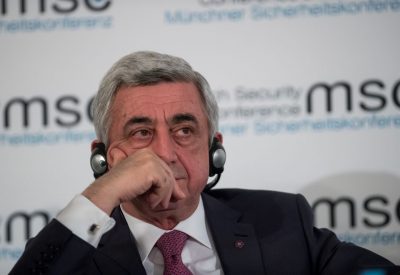Armenia’s Black Sea-Persian Gulf Corridor Plans Risk Antagonizing Russia

President Serzh Sargsyan told the audience at last weekend’s Munich Security Conference that his landlocked state was striving to become the pivotal ‘land-linked’ component of an ambitious plan to connect the Black Sea and Persian Gulf through an Armenian-transiting corridor, which is to his country’s supreme strategic interest but would undoubtedly affect the geopolitical situation in this sensitive region. For starters, this initiative would divert some of the traffic from the multimodal North-South Transport Corridor between Russia and India by cutting Baku and Moscow out of the equation when it comes to facilitating EU-Indian trade along this route, essentially replacing them with Yerevan and Tbilisi and charting a branch corridor to the Black Sea that could then lead to the bloc’s southeastern Balkan members.
Of relevance, Armenia just signed the so-called “Comprehensive & Enhanced Partnership Agreement” with Brussels despite its existing membership in the Russian-led Eurasian Economic Union, though the South Caucasian state asserts that its two institutional obligations are not incompatible. In any case, the consequences of Armenia’s Black Sea-Persian Gulf corridor plans would be disadvantageous to Russia’s strategic interests, which calls into question why Moscow’s mutual military defense ally would engage in such a policy even if it doesn’t intend to siphon off EU-Indian trade from Russia. The answer can be found in the competing “deep state” factions vying for control of Armenia, which can be divided into the pro-Eurasian integrationalists and the pro-Western obstructionists that operate as the proxies of the powerful Moscow and Californian diaspora communities, respectively.
About the second-mentioned group, they’re so pro-American that the influential “Armenian National Committee of America (ANCA)” recently implored Washington not to sell any more military equipment to Turkey on the fear mongered grounds that “Turkey may leak highly classified F-35 technology to…Russia”, so it’s little wonder then why some have suspected them of backing the anti-Russian Color Revolution attempts in their homeland back in 2015 and 2016. What both camps have in common, however, is the uncomfortable feeling that they have towards Russia’s newly pragmatic approach to Nagorno-Karabakh which emphasizes the primacy of international law and is therefore thought in a “zero-sum” way to be to the benefit of their Azeri adversaries. It’s due to this disagreement with Russia’s tacit policy shift that Armenia has sought to “hedge its bets” by reaching out to the West lately in order to “counterbalance” Moscow.
Yerevan’s plans for constructing the Black Sea-Persian Gulf corridor should therefore be seen in this context, since there’s no getting around the fact that the successful completion of this project would indirectly impact on Moscow’s interests as well, whether this is a deliberate outcome or an unwitting one. It’ll still take some time for this idea to become a reality, if at all, but it could end up being attractive to all cooperating parties, especially Iran and India if they decide to play “hardball” with Russia in response to its newfound “balancing” relations with their Israeli and Pakistani nemeses and thus take steps to cut it out of the North-South Transportation Corridor with Europe.

Proposed railway links between Armenia and Iran
The post presented is the partial transcript of the CONTEXT COUNTDOWN radio program on Sputnik News, aired on Friday Feb 23, 2018:
*
This article was originally published by Oriental Review.
Andrew Korybko is an American Moscow-based political analyst specializing in the relationship between the US strategy in Afro-Eurasia, China’s One Belt One Road global vision of New Silk Road connectivity, and Hybrid Warfare.
All images in this article are from the author.

